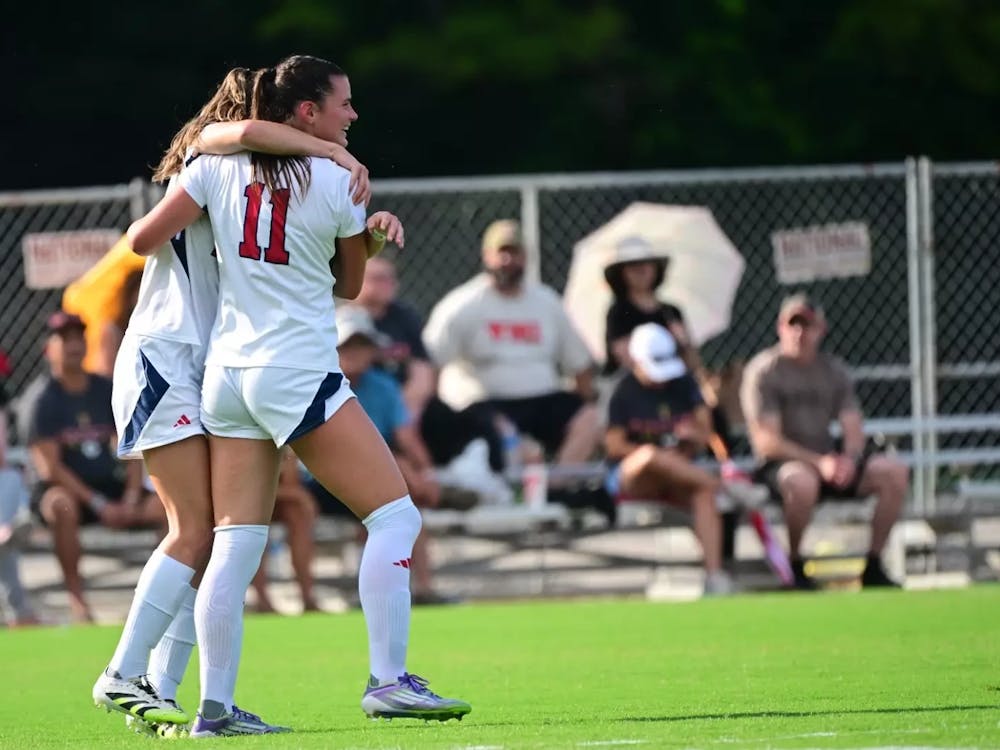Correction Appended
Alex Reisch was born in Auschwitz right after liberation. Jay Ipson hid in an underground hole for nine months. Alex Lebenstein was the only person from his hometown to survive. Helen Zimm pretended to be Catholic. Alan Zimm lost all three of his sisters, five of his six brothers and his parents.
These people are some of the few remaining Holocaust survivors who met with University of Richmond students and others Thursday night to remind them of what happened to prevent it from happening again.
The annual trip was sponsored by Hillel, the Jewish group on campus and the Chaplaincy.
Ipson, one of the founding members of the museum and current executive director, encouraged students before they began a tour of the museum to be ambassadors in their schools and workplaces.
"It's important that the students understand: If you understand, then you're not going to hate," said Ipson while wearing his signature 10-gallon hat with a Star of David and menorah on the front. "I really don't want you to tolerate me, I want you to accept me ... They all bleed the same when we cut them open. We all love the same. We all understand the same. Look at what kind of wonderful world it would be if we all accepted each other, what wonderful food we would have."
Ipson is one of the youngest survivors in Richmond and a majority of the information in the museum was about his story. Also in the museum were replicas of a ghetto, concentration camp, Kristallnacht, or the Night of Broken Glass and others. Students toured these exhibits in two tour groups. One was led by Reisch.
Reisch explained that not all camp prisoners had tattooed numbers on their arms and that prisoners wore color-coded badges to distinguish their religion, sexual orientation or ethnicity.
Reisch also told visitors about the train sounds outside the ghetto. Along with Virginia Commonwealth University students, people from the museum hooked up speakers that amplified the sound of trains that passed by on track near the museum. The sound is supposed to represent the trains that came to take ghetto residence to concentration camps.
After touring the museum, students were able to sit and eat a meal with survivors who volunteer at the museum.
Over grilled chicken and vegetables, students heard about what the survivors experienced in the 1930s and 1940s, how they got to Richmond and how much they should appreciate their education.
"It really puts things into perspective when you are getting a first hand account of this atrocity in human history," sophomore Brett Segal said.
Enjoy what you're reading?
Signup for our newsletter
Segal said the survivors, despite having to relive their experiences while telling their stories, were upbeat. Boleslaw Henry "Bud" Brodecki, 87, told jokes at his table while he clicked his tongue between sentences.
Brodecki said he was 15 or 16 years old when he was first sent to a concentration camp.
"You have to remember to be tolerant and don't get brainwashed by anyone," Brodecki said. "That's what you have to remember, to have your own mind."
The purpose of the museum is to "teach tolerance through education," according to the museum's Web site. Brodecki echoed this and recounted a story of a professor who publicly stated in 2006 that the Holocaust never happened.
KB Levin, director of Hillel, grew up as a Jewish student in Santa Monica, Calif., and learned that her ancestors in Poland were made to dig their own graves before they were shot.
"I understood that being Jewish didn't just mean bagels and lox on Sunday," Levin said. "... I had an understanding that no one on this Earth, no one on this world, no one who breathes should be made to feel inhuman."
Levin said she had wanted to give students the same opportunity to understand history and be motivated to be active in making sure something like the Holocaust never happened again.
Junior and Hillel president, Zach Gottlieb, said he was inspired by the story of survivors like Helen Zimm. Zimm's parents told her to pretend to be Catholic and she had found work as a maid in her home country of Poland until liberation.
"'You now have to be strong, to help yourself and survive,'" Zimm said her parents told her.
Zimm said: "Nobody ever was suspicious of me. In order to survive, you have to work hard."
Zimm told Gottlieb to appreciate his opportunity to receive higher education, "a luxury which they were not afforded," Gottlieb said.
Alex Lebenstein, 82, was the sole survivor of his hometown in Germany after liberation. He goes around the state, country and world giving speeches about his experience and the museum.
Lebenstein said he had tried to reach out to people not born in the time of the Holocaust and had tried to teach them to, "Never let anyone tell you that one man cannot make a difference."
Lebenstein recently published a book about his life titled "The Gazebo."
Levin told students after dinner that the survivors had requested they send letters. Levin and Matthew White, inter-religious and justice coordinator for the Chaplaincy, are collecting those letters. Levin will deliver the letters to the museum personally, she said.
The trips to the museum will continue, Levin said, possibly once a semester instead of once a year.
Correction: March 30, 10:02 a.m. -- This version of the article CORRECTS the spelling of a name in the opening paragraph of the story to Alex Lebenstein STED Alex Lenstein.
Contact staff writer Stephanie Rice at stephanie.rice@richmond.edu
Support independent student media
You can make a tax-deductible donation by clicking the button below, which takes you to our secure PayPal account. The page is set up to receive contributions in whatever amount you designate. We look forward to using the money we raise to further our mission of providing honest and accurate information to students, faculty, staff, alumni and others in the general public.
Donate Now


